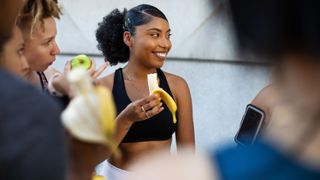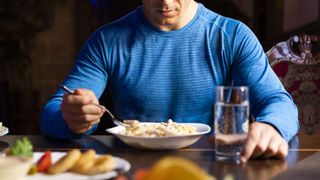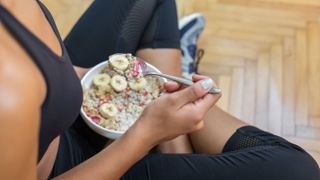What to eat before a workout
Not sure what to eat before a workout? Experts reveal the best way to fuel different types of exercise

Unsure what to eat before a workout? There’s a real science to what passes your lips before training: typically, you’ll want to consume slow-release carbs for longer endurance sessions and you’ll need fast-release carbs for short, intense workouts.
But what counts as a slow-release or fast-release carb? And how do other macronutrients, like protein and fats, help during training? We asked a group of qualified nutrition experts to explain.
What should you eat before a workout?
Pre-training nutrition should be determined by the type of exercise you plan to do and the physiological adaptation you’re trying to achieve – like gaining muscle or losing weight. But carbs are best for providing energy.

If you favor exercises like HIIT, weightlifting, or power training, you should attempt to prioritize quick-releasing high-glycemic carbs that spike sugar levels for a quick energy release. Think instant oatmeal and sports beverages. If you prefer low-intensity endurance exercise like longer runs, slow-release carbs planned a few hours to an hour in advance will help sustain energy release over time. Think quinoa, whole grains, sweet potatoes, and pulses in this case.
Rob Hobson, Head of Nutrition at Healthspan Elite, recommends consuming something quick-digesting before your standard workout – like toast with peanut butter, an oat smoothie, or a banana. But for a long race lasting more than an hour, Hobson says you should ideally plan carb intake more carefully, “aiming for up to 4g of carb per kg of body weight, which means eating several meals starting four hours before you hit the start line”.

Rob Hobson is an award winning registered nutritionist with 15 years of experience working in the industry. He's previously worked with public health bodies in the UK, along with trade bodies and private clients. He holds a BSc in Nutrition and an MSc in Public Health Nutrition and has delivered lectures at various universities in the UK.
Jamie Wright, Myprotein nutritionist, agrees that carbs should be the main focus leading up to a workout, but says you shouldn’t overlook other macronutrients. “A source of high-quality protein can further reduce the breakdown of existing protein structures (like muscle) and may contribute to a reduced recovery period post-workout,” he says. “But for simplicity’s sake, and because some can experience digestive issues when having protein pre-workout, I usually suggest having carbohydrates leading into training and protein after.”
Why you should eat carbs before a workout
There are actually three different sources available to your body for energy: carbs, proteins, and fats. All play a crucial role in helping your body function, but carbs are the body’s main energy source.
Fat can be utilized as an energy source but it’s usually only tapped into when you’re in a fasted state and haven’t consumed any carbohydrates. And the body typically only uses protein for fuel when it can’t access either carbs or fat. As such, having a good supply of carbohydrates is crucial for workouts, as it provides the energy you need.

Wright explains the science behind it: “When we work out, our body burns through a molecule called adenosine triphosphate (ATP) at a much higher rate than usual. ATP is simply the body’s ‘currency’ of energy, and all processes in the body require a certain amount.
“Consumed or stored carbohydrates are like large daisy chains of smaller units of carbohydrates. When we eat carbohydrates or need to use our stored supplies, we have to cleave off these smaller units from the chain to transport around the body for energy,” he explains. “Glucose [from carbohydrate] is one example of this and it travels in the blood to our cells. If it’s to be used to produce energy, it enters a series of complex processes known as cellular respiration to produce ATP.
“Carbohydrate produces a tonne of ATP during these processes, which makes it, at least in my – and the bulk of available scientific literature’s opinion – the best nutrient to have leading into a workout.”
Wright adds that eating carbs pre-workout also reduces or delays the use of existing energy stores (namely glycogen, the stored form of carbohydrate within our muscle and liver), which can extend how long you can exercise.

Jamie Wright is an accredited nutritionist, with a BSc in Sports and Exercise Science and an MSc in Human Nutrition. He's currently the head nutritionist at Balance; a team of fully qualified nutritionists and dieticians working with everyone from office workers to Olympic athletes.
When should you eat before a workout
Most advice states that you should eat two to three hours before a workout. A small study, published in Nutrients Journal, compared the effects of a six-hour versus three-hour pre-feeding regimen in a group of eight active women. In general, performance results were more favorable for the three-hour group, suggesting that this really is the golden time for loading up with food.
However, it’s not always possible to adhere to this two-to-three-hour rule. “If you have an early morning training session (especially if you don’t fancy eating before your session), having a carbohydrate-rich meal the evening before can still help give you the energy you need,” suggests Hobson.
Should you eat after a workout?
If the thought of eating before you train turns your stomach, there could be some benefit to skipping on a feed altogether. Brian Carson, head of science and innovation at Whole Supp and a senior lecturer in exercise physiology, tells Live Science that exercising following a period of fasting can promote adaptation towards your body’s ability to utilize fat as a fuel source.
“We have previously published a systematic review and meta-analysis at the University of Limerick examining this approach and found a greater utilization of fat during exercise, with no negative impact on performance for exercise which lasts less than 60 minutes when performed in a fasted state,” he explains. “We also recently published research looking at restricting carbohydrates pre-exercise and feeding protein before high-intensity sprint interval training, and found that this was an excellent approach for this short intermittent type activity.”

Brian Carson, Phd, is a senior lecturer in exercise physiology at the University of Limerick, where he is pursuing research into the role of exercise and nutrition in the regulation of metabolism for performance and health. He's also the head of science and innovation at Whole Supp.
Hobson suggests that other factors can help you decide whether to plan a pre-workout meal. “Some people like to train on an empty stomach, and endurance athletes often train after fasting, known as ‘training low,’” he explains. “The effect of intermittently periodizing your nutritional intake in this way (intermittent fasting) is that the body adapts in positive ways, like improving the oxidation of fats (breakdown of fatty acids); this has a glycogen-sparing effect and can enhance performance when racing.”
In other words? There’s no one size fits all approach to pre-exercise meals. Fasting has benefits, but if your body is in a significant calorie deficit, you might not have the energy to perform.
Sign up for the Live Science daily newsletter now
Get the world’s most fascinating discoveries delivered straight to your inbox.

Sam Hopes is a level III fitness trainer, level II reiki practitioner, and resident fitness writer at Future PLC. Having trained to work with both the mind and body, Sam is a big advocate of using mindfulness techniques in sport and aims to bring mental wellbeing to the forefront of fitness. She’s also passionate about the fundamentals of training and how we can build more sustainable training methods. You’ll find her writing about the importance of habit-building, nutrition, sleep, recovery, and workouts.
